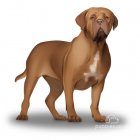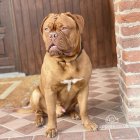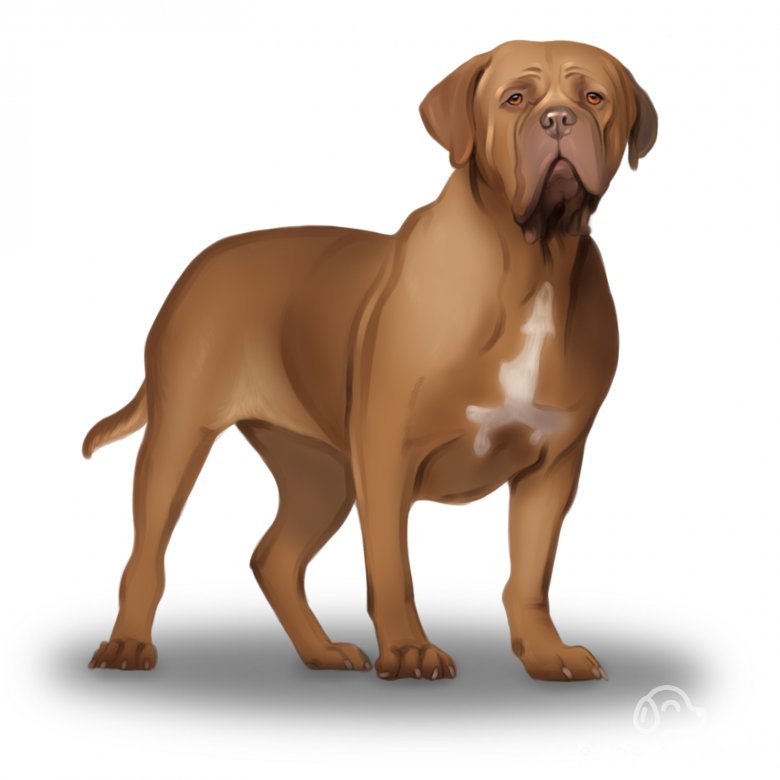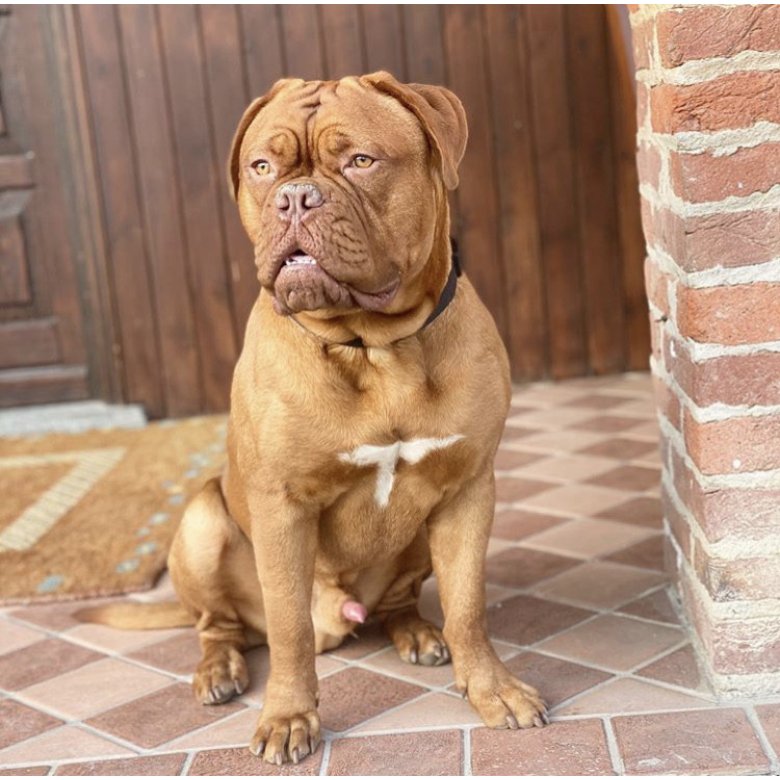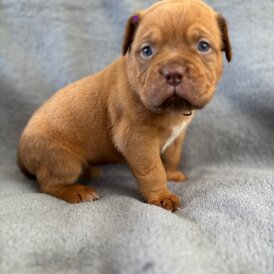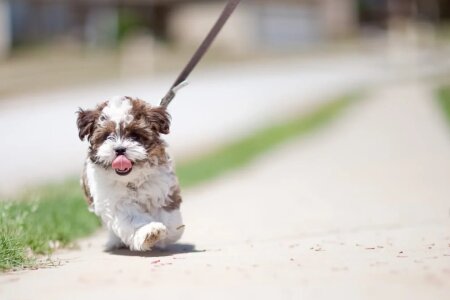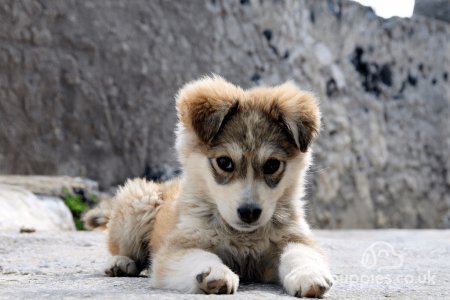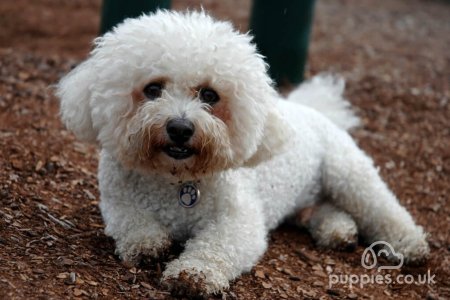The Dogue de Bordeaux is a big dog with an equally big heart. This French mastiff breed can make an excellent watchdog due to its imposing size, but they’re also one of the friendliest pets to welcome into your home. Big, powerful, and certainly capable of pulling large loads, the Dogue de Bordeaux is also a practical dog breed that’s currently gaining in popularity in the UK. These loyal companions have an exceptionally long history of providing owners with devotion as well as security thanks to their intimidating size, and they’re an excellent puppy choice for anyone that wants a strong, loving bond with their pet.
Why Dogues de Bordeaux are Great
Some highlights of Dogues de Bordeaux:
Loyalty: this breed is loyal, obedient, and well-mannered with owners and families and will create a strong bond of companionship.
Watchdogs: this breed was originally used as a guard dog, making it an ideal guard and watchdog.
Training: although repetition may be necessary, the Dogue de Bordeaux is able to reliably learn and obey.
Strength: owing to their impressive strength, this breed was widely used for pulling carts and sleds. Their strength helps them to be effective guard dogs today.
Wanderlust: this breed is not prone to wandering or escaping from home if given the opportunity.
Things to Consider when Looking at Dogues de Bordeaux for Sale
Some downsides to the Dogue de Bordeaux:
Apartment living: such a big dog breed requires plenty of space to roam and play freely. This breed is not ideal for apartment dwellers and will be happiest in a larger home.
Short lifespan: this breed unfortunately doesn’t live beyond eight years in most cases. Larger dogs tend to have shorter lifespans, and the Dogue de Bordeaux even more so.
Drool: if you aren’t a fan of slobber, avoid purchasing a Dogue de Bordeaux. This breed tends to drool regularly and in large amounts.
Cost: this large breed can cost owners substantially, sometimes over £1200 per year in food, visits to the veterinarian, and more.
History of the Dogue de Bordeaux
The exact historical origins of the Dogue de Bordeaux are unknown, but it is believed that the breed was referred to in Mediaeval French hunting books. It may also be possible that the Dogue’s predecessors existed as guard mastiffs in antiquity, during the reign of Julius Caesar. The heritage of the modern Dogues likely stems from the breeding of Bulldogs, imported from England to France during the middle ages, with larger cattle dogs and hounds native to the south of France. An interesting side note: the Bulldogs brought to France by the English were themselves originally an importation from the Norman French during the Norman Conquest. This back and forth breeding across the channel with various types of local dogs led to breeds such as the Dogue de Bordeaux.
Appearance
As one of the largest dog breeds, the Dogue de Bordeaux can be identified by its wide, powerful, and massive physique. Although they’re tall, their size comes mostly from their robust and thick body, shoulder, and leg muscles. Other breeds such as the English Mastiff are significantly taller. A fine and short coat of fawn-coloured fur of various tones is to be expected, and a coloured mask in red, black, or brown is common as well. Marks and pigmentation may also be present, although it should not be found outside of the toe tips or chest in order to comply with the Dogue de Bordeaux Club of Great Britain’s breed standards.
How big is the Dogue de Bordeaux?
Dogues de Bordeaux are large/giant-sized dogs. Males grow on average to 60-69 cm in height, whilst females can grow up to 58-66 cm high.
How heavy is a Dogue de Bordeaux?
Fully-grown adult male Dogues de Bordeaux weigh approximately 68 kg on average, whilst females weigh approximately 57 kg.
What colour is the Dogue de Bordeaux?
The Dogue de Bordeaux Club of Great Britain recognises the following colours for Dogues de Bordeaux:
Fawn, ranging from mahogany to Isabella. Chocolate-coloured dogs are undesirable.
Black mask
Brown mask
No mask (same colour as fur)
Temperament
The Dogue de Bordeaux is a well-mannered breed if given the care and affection necessary as a puppy. Socialisation and proper training are well worth the effort, however, since these puppies will tend to grow into loving, loyal companions. In fact, they may even become overprotective of their owners, and due to their superb intelligence, they can also be stubborn at times. Overall, Dogues de Bordeaux are an ideal puppy choice for many reasons. Since they create such a strong bond with their owners, it’s best that they’re purchased as puppies and raised well from the very beginning. Conversely, neglecting to train or care for your Dogue can result in destructive behaviour.
Do Dogues de Bordeaux make good guard dogs?
One of the best watchdogs you can purchase is a Dogue de Bordeaux. They’re large, imposing, and intimidating and will defend their territory and owner with vigour.
Do Dogues de Bordeaux bark a lot?
This breed doesn’t tend to bark much at all, although it will bark to alert its owner to intruders or suspicious activity in the home. Puppies may bark out of excitement or whilst playing.
Are Dogues de Bordeaux easy to train?
Dogues de Bordeaux are fairly easy to train due to their high intelligence. They’re also sometimes stubborn, however, so repetition may be necessary to encourage effective training.
Are Dogues de Bordeaux playful?
Most puppies love to play, but the Dogue de Bordeaux isn’t as playful as many other breeds.
Are Dogues de Bordeaux good with children?
As a well-mannered breed, the Dogue de Bordeaux gets along well with children.
Are Dogues de Bordeaux good with other pets?
Dogues de Bordeaux get along well with other pets. Cats, dogs, and other small pets aren’t a problem for this breed.
Can I leave a Dogue de Bordeaux alone?
This breed tolerates being left alone a little better than many other breeds, but that’s no excuse to neglect him for extended periods of time. Spend plenty of time, especially as puppies, and they’ll return the love as they grow older.
Do Dogues de Bordeaux like water?
Many Dogues de Bordeaux enjoy swimming; many do not. Don’t frighten your puppy with the prospect of swimming if he isn’t ready for it. He may be forever afraid of the water, but he may also feel curious enough to dip his feet in for a moment.
Health
How long do Dogues de Bordeaux live?
Generally, Dogues de Bordeaux are expected to live anywhere from 5-8 years, but some can live up to 10 or even 12 years.
How much exercise does a Dogue de Bordeaux need?
Dogues de Bordeaux don’t require too much exercise. Of course, you should make a habit of taking him out for an occasional walk in order to stimulate physical and mental wellbeing, but it’s less demanding than for many other breeds.
What are the Dogue de Bordeaux’s common health issues?
Larger dog breeds tend to have shorter lifespans than smaller breeds. Furthermore, Dogues de Bordeaux are prone to a few health issues as follows:
Weight gain: an unhealthy lifestyle and diet can lead to significant weight gain.
Aortic stenosis: heart problems may be more common to this breed.
Breathing problems: due to their large heads, Dogues de Bordeaux may encounter difficulties breathing, particularly in hot or humid weather.
Care
How much space do I need for a Dogue de Bordeaux?
You’ll want to ensure that you have plenty of space in your home when considering the purchase of a Dogue de Bordeaux puppy. They won’t be happy living in an apartment or confined home and need a garden or yard where they can roam.
What should I feed my Dogue de Bordeaux?
Dogues de Bordeaux should eat 6 to 8 cups of dry food per day, divided into two meals. Puppies should be fed about half of this amount, without overfeeding since Dogues are prone to putting on weight easily.
How much grooming do Dogues de Bordeaux need?
This breed requires little grooming. Flea treatments and ear and eye inspections should be done regularly to ensure that there are no infections.
Do Dogues de Bordeaux shed?
This breed sheds a moderate amount, so you should endeavour to brush regularly to remove dead hairs.
Average Costs
How much does it cost to keep a Dogue de Bordeaux?
As a rough guide in pricing: Cost to buy: roughly £700-1,000 for a well-bred Dogue de Bordeaux puppy Other costs (Vet, Food etc): £120-200 per month
Specific Buying Guide
You can read our general buying guide here, with the most important thing being going to view your Dogue de Bordeaux puppy, seeing it with its mother, and checking the quality of the breeder. More specifically, here is some Dogue de Bordeaux puppy buying advice:
Dogues de Bordeaux are amongst the most popular breeds in the UK as of late, so beware of scams and ‘puppy mills’ that engage in unscrupulous breeding practices. If demand is high, then you should be prepared to pay a little more for a puppy that’s properly microchipped, vaccinated, and that comes from a reputable dealer. If the price seems too good to be true, it probably is.
Ensure that the puppy meets the standards set out by the Dogue de Bordeaux Club of Great Britain and the Kennel Club of Great Britain. Deviations and faults should be identified before purchasing, such as chocolate fur or white pigmentation from above the neck.
Other Reading, Adopting Dogue de Bordeaux Puppies and Rescue Organisations
A big thank you to the following sources who helped to shape this article: Kennel Club of Great Britain: https://www.thekennelclub.org.uk/services/public/breed/display.aspx?id=5224 Dogue de Bordeaux Club of Great Britain: https://www.ddbclubofgb.co.uk/






